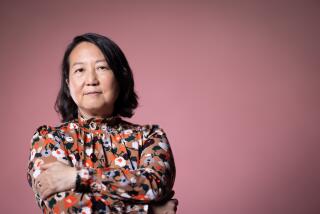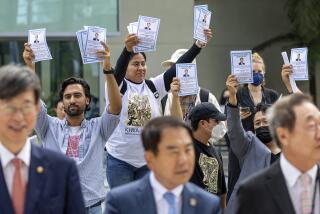Lawsuit Tests Legality of Hyundai-Kia Links
- Share via
In the global auto industry, the lines between competitors and collaborators have become increasingly blurred over the years. A Los Angeles judge is set this week to decide whether, in at least one instance, things have gone too far.
The case stems from a wrongful termination suit filed by a veteran South Korean auto executive, who has alleged that automakers Hyundai and Kia violated U.S. antitrust laws by conspiring on pricing and marketing plans to avoid competing with each other.
On Tuesday, Los Angeles County Superior Court Judge Haley J. Fromholz is expected to rule on a motion to dismiss the case against Irvine-based Kia Motors America, Hyundai Motor America of Fountain Valley and their Korean parent companies.
The California subsidiaries are the U.S. import and distribution arms of automakers Hyundai Motor Co. and Kia Motors Co. Lawyers for the companies deny the allegations and maintain that their clients could not violate antitrust laws because they are controlled by the same parent, Hyundai Motor Group, in South Korea.
“You cannot have a conspiracy of one,” said Richard Sheldon, a Los Angeles attorney for Hyundai Motor America.
Attorneys for the automakers say that if the case is tossed out, it would validate their legal position and allow Hyundai and Kia to work much more closely in the U.S. market.
But the suit filed by former Hyundai executive Soo Ho Suh, who was working in the U.S., claims that the two automakers are separate and competing entities under American law. Suh alleges that Hyundai dropped plans to sell a minivan in the U.S. so that a new Kia minivan would have a better chance of selling.
“They were colluding with each other to divide the market among themselves to avoid competition,” said Kevin Kim, Suh’s attorney.
Suh, 48, filed his suit in August and claims he was dismissed because he refused to participate in meetings that violated the two automakers’ antitrust guidelines. To bolster his case, he cites internal documents from Kia raising concerns about anti-competitive behavior with Hyundai.
Hyundai is a fast-growing import brand with a 2.5% share of the U.S. auto market in January, ahead of more established brands such as Mitsubishi and Mazda. Kia also has seen its sales rise and claimed a 1.7% market share in January, equal to Volkswagen and BMW.
Suh’s lawsuit sheds some light on the legal complexities that have developed in an era of increasing globalization in the auto industry, where mergers, cross-ownerships and joint development deals have become quite common.
General Motors Corp., for instance, has overlapping ownership or equity investments with, among others, Isuzu Motors Ltd., Suzuki Motor Corp. and Fuji Heavy Industries Ltd., which makes Subaru vehicles. And Ford Motor Co. owns Volvo, Land Rover, Jaguar and Aston Martin in Europe and has a 35% controlling interest in Mazda Motor Corp. in Japan.
Hyundai and Kia were once rivals in the South Korean auto market. But things changed in 1998 when Hyundai Motor Co. outbid Ford to buy a stake in ailing Kia. Then Hyundai Motor Co. Chairman Mong Koo Chung became chief executive and chairman of both companies.
Hyundai Motor now owns 36.3% of Kia Motors while Hyundai Capital, a sister company, owns 9.8% of Kia, according to court filings.
Last April, the South Korean Fair Trade Commission ruled that Hyundai and Kia were legally one entity, according to court documents.
But at issue in the Los Angeles case is whether Hyundai and Kia’s American subsidiaries remain competitors in the U.S. market and are subject to the Sherman Act prohibition against any “contract” or “conspiracy” that would constitute a restraint of trade.
Lawyers for Kia and Hyundai cite a 1984 case, Copperweld Corp. vs. Independence Tube Corp., in which the Supreme Court ruled a company could not be accused of conspiring with a subsidiary to violate antitrust law because they were both effectively the same company with shared economic interests.
But the Copperweld case dealt with a wholly owned subsidiary. The law is less clear when the ownership stake is significantly less than 100%, experts say. “It’s a difficult area when you’re talking about anything but completely owned subsidiaries,” said Spencer Waller, director of Loyola University’s Institute of Consumer Antitrust Studies in Chicago. “Anything below that, there’s still room for dispute.”
Rocque Lipford, an automotive expert with law firm Miller, Canfield, Paddock & Stone in Monroe, Mich., said Justice Department officials acknowledge that automakers and their suppliers need to share information to operate and compete effectively. But, he added, “there is never any reason for two competitors to be discussing contemporaneous pricing or any future pricing prospects.”
In April 2001, Suh arrived in California as part of a four-member task force team sent to Kia’s American headquarters.
In his lawsuit, Suh claims that Hyundai and Kia decided to split up segments of the U.S. market and share information about their marketing, pricing and sales of selected vehicles. In November 1999, Suh alleges, Hyundai decided to cancel the rollout of the Hyundai Trajet minivan in the U.S. to reduce competition for Kia’s planned Sedona minivan.
When Sedona was introduced in late 2001, the minivan was well received by critics. In 2002, the Sedona finished ninth among minivans with 39,088 units sold, besting the Plymouth Voyager, Mercury Village, Nissan Quest and Mazda MPV minivans, among other models.
By then, however, Suh’s career at Hyundai had ended.
When he joined Hyundai in 1982, fresh out of college, Suh said, he thought he was signing on for a lifetime career with one of South Korea’s most prominent companies. He started out in the export-promotion department and in five years was running the division. In 1990, he was sent to Hyundai’s Canadian subsidiary to oversee marketing and promotion. And in 1997, when Hyundai decided to make a big push into the Indian market, he was sent there.
Within two years, Hyundai was the top import brand in India, and in 1999 Suh received the company’s top prize, the Chairman’s Award. In 2001, he was named general manager of the Indian subsidiary.
Then, Suh said, he was asked to join a Kia effort to help revitalize Kia’s ailing business in the U.S. After spending several weeks in planning sessions with Kia and Hyundai executives in Seoul, Suh moved to work in Kia’s office in Irvine. His wife and two children later joined him in California.
In the fall of 2001, Suh was dismissed because of alleged improprieties when he oversaw Hyundai’s Indian office, according to Kia attorneys. Suh denies this allegation, saying he was forced out after he refused to participate in activities that he believed violated U.S. laws.
Attorneys for Hyundai and Kia deny that they have shared any sensitive information that would violate antitrust laws.
Meanwhile, Suh has looked for a job in the United States and South Korea, without success. “I don’t know what to say to my family,” he said. “They were so proud of me and my occupation.”






